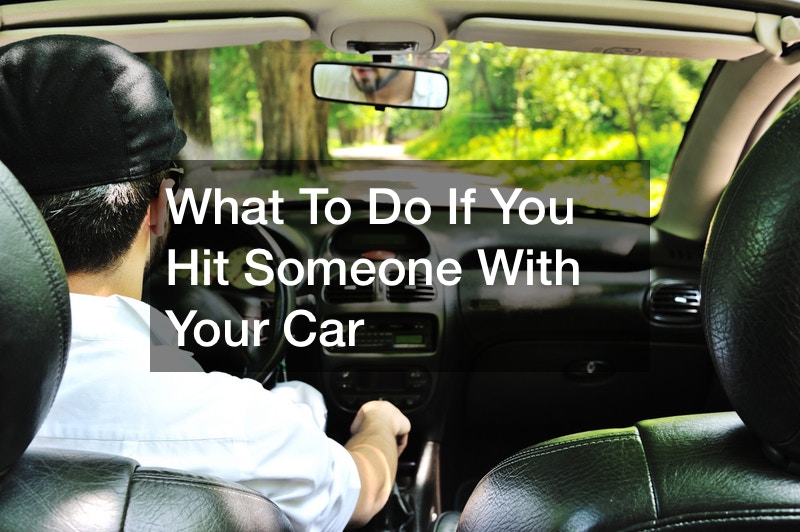
No one likes to think that they may be involved in a car accident. No one plan’s ahead on what to do if you hit someone with your car, but it is a conversation that needs to be had. Accidents happen every single day, actually, they happen every single minute of every single day across the US. What you do after the accident really matters.
If you hit someone with your car you will need to know what to do and what not to do. How you act after the accident can determine a big chunk of your future after the accident.
Rule Number One (Doing This is Crucial)

If you hit someone with your car the very first thing you should do is stay put. Leaving the scene of an accident whether you are at fault or not, in and of itself is a punishable crime in most states. Yes, it can be scary to have to sit there and wait for authorities if you hit someone with your car, but it is really your only option. Leaving can mean being charged with additional crimes.
The only way to address the situation is to stay, you can let the car accident attorney handle things down the road if you stay. If you leave you will need a car accident attorney to handle the accident and likely a criminal defense attorney to handle your criminal charges.
Unless you are drunk at the scene, driving without a license, driving a stolen or unregistered vehicle, under the influence of drugs, you will not be arrested at the scene. Just sit in your car and wait and follow the tips below.
Keep Quiet and Follow Directions

If you hit someone with your car, do not become argumentative with the other driver. Do not become argumentative with the authorities. The best thing you can do according to a leading personal injury law firm is to say as little as possible.
Remember the old “anything you say can be used against you in a court of law” that is a true statement. The way you act if you hit someone with your car can come back to bite you, big time. Be cooperative with the authorities. If you need medical attention, even if you hit someone with your car, you are entitled to medical attention.
The goal immediately following the accident is to show the authorities that you are not a bad person. You want to show that this was just an accident and that you are a reasonable person. Of course, if you have been drinking, this may be a little hard to show. The best way to avoid having to hire a drunk driving lawyer, is, of course, not to drink and drive.
What To Do If You Have Been Drinking and You Hit Someone With Your Car
If you are driving drunk or buzzed, and you get into an accident, the same, “stay where you are” applies. If you hit someone with your car after you have been drinking, leaving the scene is only going to make things worse. Yes, you may be arrested at the scene and may have to get in touch with a bail agency to get you out, but the situation can get a lot worse if you run.
Let’s face facts if you are driving drunk, and you leave the scene, remember you are drunk and a lot likely able to make good decisions. You will get caught. When you get caught you will be arrested. It will cost you more to pay the bondsman to get out of jail because your bond is going to be much higher if you run.
You will also pick up some additional charges. What goes from a simple DUI charge with a small bond that any bail bond company can pay, now becomes a much tougher case, with a much higher bond, and you are facing much stiffer penalties.
Here are some tips for handling a situation if you hit someone with your car and you have been drinking:
- Stay in your car until authorities arrive if you can. Don’t move your vehicle.
- You will have to take a breathalyzer if the police think you are intoxicated. Take the test. A lot of people believe that if they refuse to blow then the police will have no evidence. In almost every state there is a “no blow, no license law”. The Department of Motor Vehicle can suspend your license for up to one year in many states for refusing to submit to a breathalyzer test. Of course, you can refuse if you are knowingly intoxicated, and the authorities can take you to the hospital and have blood drawn (which is a lot harder to dispute in court). Take the test, let your lawyer worry about fighting the charge.
- Do your best to follow directions. Being cooperative could bode well for you in court.
Being obnoxious, arguing with people at the scene, or harassing the cops is not going to do you any favors. If you hit someone with your car and you have been drinking you are already in enough trouble, do not make it worse by trying to explain your position, make demands, or try to fight anyone.
If you have been drinking and hit someone with your car and were injured in the process. You are entitled to medical care before you are arrested. It is against the law to not get treatment if you are in need of it whether you are intoxicated or not.
Being charged with a DUI is not being convicted of a DUI, you still have rights. A DUI attorney will ensure that your rights are protected after the accident.
The Day After

As soon as you can, it is time to lawyer up. Whether you are guilty or innocent of being charged with hitting someone, you need a lawyer. If you hit someone with your car because of a faulty garage door that needed garage door service, or you ran a stop sign that was barely visible, a lawyer can fight back for you and defend you.
Some states are “no-fault” states where an accident is just an accident and it does not have to be someone’s fault. Other states are not “no-fault” states which means that someone has to be charged with the accident.
For example, you are driving along and see a sign for Repairable Salvage RVs for Sale, you slow down to take a look. You hit a patch of ice, you can’t stop and hit the car in front of you. You were not really distracted, nor were you traveling at an unsafe rate of speed. After all, you were slowing down to see what the dealer was selling, yet you are charged with “traveling at an unsafe speed” which left you unable to stop in time to not hit the car in front of you.
In states that do not have “no-fault” laws it is always someone’s fault. It does not matter that there was that patch of ice that the city did nothing about, it does not matter that you were literally creeping along, you will be charged. That ticket can affect your driver’s license, your insurance rates, and can drag on through court for months. Having a lawyer that is experienced in handling these types of cases will help you navigate the issue and hopefully, get you off scot-free.
Don’t Admit Fault
If you hit someone with your car it can be a knee-jerk reaction to admit fault and start apologizing. It is fine to say “are you okay?” and help the driver out to get to safety, but it is not okay to say “Oh my God, I was on my way to my dentists office and my kid texted and I was looking at my phone and did not see you” it may be the truth, but that statement can cost you plenty.
With a statement like that you just incriminated yourself, and gave the other driver the fuel they need to sue you. If the injuries sustained are extreme or even fatal, you are going to go to jail, and likely be charged with vehicular manslaughter if someone died in the accident.
There may be a time down the road when you will have to admit fault, under the advice of your attorney, but that time is not at the accident site. It may feel like the right thing to do, but you can seriously damage your chances of keeping your license, avoiding very expensive charges, and staying out of jail.
Before you make any statements to the insurance adjuster, or anyone else, speak to a lawyer. If you hit someone with your car, and you know that you were in the wrong, talk to a lawyer. No one says you should lie at the scene, you can just not provide information, and let your lawyer handle it.
The Insurance Adjuster
If you hit someone with your car you undoubtedly will speak with an insurance adjuster, and potentially an insurance investigator about the accident. Keep one thing in mind when you are speaking to the adjuster, they are not your friend. They have a job to do. That job is to protect the insurance company and look after the insurance companies interests.
The adjuster can be very persuasive and may even take what you say out of context to protect the interests of the insurance company. Let’s say you sustained injuries when you hit another driver. The insurance adjuster calls you about the accident. The first thing they will ask is “how do you feel?” it seems like a salutation almost. However, the adjuster is actually asking you how you feel since the accident. Saying “oh I am good, how are you” can be misconstrued that you feel fine. Three months down the road when you are still visiting the chiropractor or other health care provider, the insurance company can come back and say “three months ago they said they were fine” we do not want to pay for this medical care anymore.
The moral of the story is to be very careful about what you say. The insurance adjuster is not on your team. They have a job to do and they do it well. Before you give a recorded statement (most conversations are recorded so they can be presented as evidence if need be) talk to your lawyer. Your lawyer is the best resource of information about your rights.
Your Liability

Hopefully, if you hit someone with your car, you have good insurance coverage, if not you can be held personally liable for the costs of the accident. In some cases of negligent behavior on your part, your insurance company may deny the claim and you will still be personally liable for the cost of the accident.
If you hit someone with your car you can be criminally liable and civilly liable. Criminal liability can go away with the help of a good lawyer, but civil liability can stick around for years and years. Let’s say you were criminally cleared of being at fault because of a loophole in the law, that does not end your liability for the accident. Cases like wrongful death cases in civil court often “convict” people that were found innocent in criminal court.
Civil cases do not have the same burden of proof that criminal cases do. You can be found “guilty” of a civil penalty even when you were found innocent of the criminal charges. The worst part? Civil monies owed can go on for years.
Any time you come into any type of windfall that money can go right to that civil judgment. Your wages can be garnished, tax refunds can be taken, and any other income can be attached. Civil judgments typically stand for 10 years, but that is not the end of them. Judgments can be renewed every 10 years by simply filing with the court for the renewal.
Think of it this way if you had a metro accident, and thought you deserved to be paid for it, how many times would you file that extension for the judgment. That is how many times the person you hit and their lawyer will file that extension.
If you hit someone with your car, the costs can be incredible. It is important that you are represented by an attorney that is an expert in accident law.


